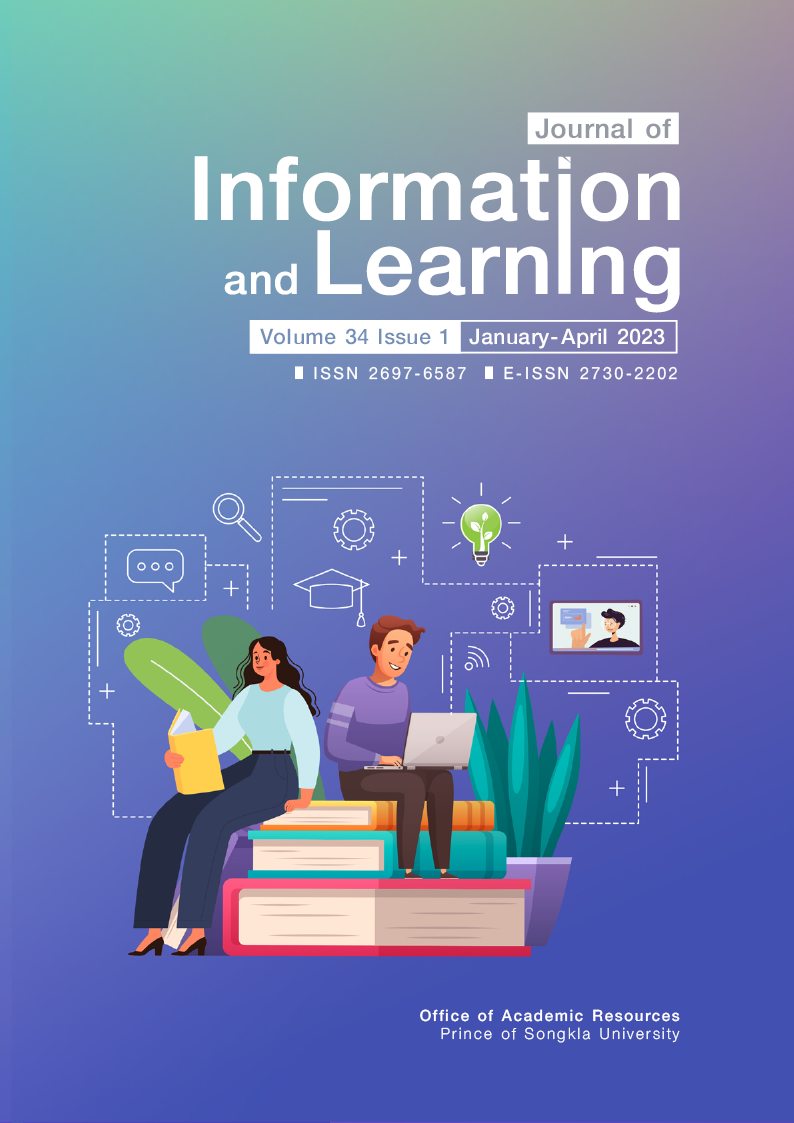Development of Students’ Achievement and Satisfaction towards Online Learning with the Google Classroom Application Using the T5 Model
Main Article Content
Abstract
The objectives of this research were 1) to study the effectiveness index of online learning with the Google Classroom application using the T5 model, 2) to investigate the learning achievement towards online learning with the above method, and 3) to examine the satisfaction of the learners with this online learning with the Google Classroom application using the T5 model. The sample group comprised nine students of Information Management who had registered in the Digital Information Management subject in semester 1/2021. Research tools consisted of a lesson plan, a pre-test and post-test on learning achievement, and a satisfaction questionnaire. Data were analyzed by percentage, mean, standard deviation (SD), effective index, and t-test. The research results showed that the effectiveness index of the learners who learned with such an approach was 0.7441 or 74.41%. Students' learning achievement after learning with T5 model using the Google Classroom application was higher than their achievement before learning with the proposed method at a level of significance of .01 Furthermore, the satisfaction level of the learners was at a high level (M = 4.48; SD = 0.59). The results thus showed that online learning with the Google Classroom application using the T5 model interested and encouraged the learners to learn.
Article Details

This work is licensed under a Creative Commons Attribution-NonCommercial-NoDerivatives 4.0 International License.
The Journal of Information and Learning is operated by the Office of Academic Resources, Prince of Songkla University. All articles published in the journal are protected by Thailand copyright law. This copyright covers the exclusive rights to share, reproduce and distribute the article, including in electronic forms, reprints, translations, photographic reproductions, or similar. Authors own copyrights in the works they have created as well as the Office of Academic Resources. The Journal reserves the right to edit the language of papers accepted for publication for clarity and correctness, as well as to make formal changes to ensure compliance with the journal's guidelines. All authors must take public responsibility for the content of their paper.
References
Julpoon, J. (2003). A development of internet lesson on radio programme types for the undergraduate students of Prince of Songkla University [Master's thesis, Prince of Songkla University]. PSU Knowledge Bank. http://kb.psu.ac.th:8080/psukb/handle/2010/6081
Kaewroung, M. (2009). Effects on utilization of Prathomsuksa 3 students’ CAI-based learning modules on their conso-nance spelling skills in Anuban Huai Sak School, Office of Chiangrai Educational Services Area 1 [Master's thesis, Chiang Rai Rajabhat University]. ThaiLIS. http://bit.ly/432hNLy
KPRU-ResPoll. (2021, June 29). An opinion poll on the situation of Covid-19 “Online teaching in the situation of the epi-demic of Covid-19”. 38 Rajabhat University Network. https://register.kpru.ac.th/RajabhatPoll/?nu=20200007_report_poll
Liangpanit, S. (2010). A study of learning achievement and satisfaction by using the social network websites for third-year students Majoring in Computer Science. https://madlab.cpe.ku.ac.th/TR2/?itemID=1050094
Ministry of Education. (2020). Guidelines for teaching and learning management of schools under the Office of the Basic Education Commission in the situation of the coronavirus disease 2019 (COVID-19) outbreak, academic year 2020. https://drive.google.com/file/d/10XimN9dhsaZJHMKHGKkdoS_yjtMyEOTd/view
MIS PSU. (2021, July 8). Check grade. MIS PSU. http://mis.pn.psu.ac.th/wait.php?type=suspend
Morteza, A., Hooshang, T., & Hamid-Taher, N. D. (2019). Development and validation of a test anxiety inventory for online learning students. Journal of Educators Online, 16(2), 16. https://eric.ed.gov/?id=EJ1223936
Newrat, K., Pinyoanuntapong, B., Naiyapatana, O., & Meechan, S. (2011). The estimation of the reliability of a test under the congeneric model and three - parameter logistic model. Journal of Educational Measurement Mahasarakham Univer-sity, 17(1), 83-93. http://ir.swu.ac.th/jspui/handle/123456789/992302
PPTV Online. (2020, December 22). New Normal. PPTV HD 36. https://www.pptvhd36.com/news/ประเด็นร้อน/138727
Roungrong, P., & Hwanchaaim, M. (2015). The use of Google Apps in the development of innovative Teaching. Naresuan University.
Rujjanapan, B. (2021, June 29). Online learning. Google Classroom. http://www.thaiall.com/google/classroom.htm
Salaeh, S. (2018). Effect of flipped classroom approach with T5 paper model in stoichiometry on success in task, learning achievement, academic responsibility and satisfaction of the grade 10 students, Benjamarachutit School, Pattani [Master's thesis, Prince of Songkla University]. PSU Knowledge Bank. https://kb.psu.ac.th/psukb/handle/2016/12158
Silphipant, S., Sajjanand, S., Malaiwan, R., Vattanadumrongkit, V., & Wongchirdtum, N. (2008). E-learning via T5 model in international economics course. Institute for Research and Development, Sukhothai Thammathirat Open University.
Singhard, S., Kittiworavej, S., & Suriya, A. (2018). Achievement and satisfaction of nursing students exposed to Google Classroom in nursing information technology. Humanity and Social Science Journal, Ubon Ratchathani University, 9(2), 124-137. https://so02.tci-thaijo.org/index.php/human_ubu/article/view/187118/131637
Sonprasom, S. (2016, May 29). Satisfaction on the use of classroom in Physics I for engineering students [Conference session]. RSU National Research Conference 2016, Bangkok, Thailand. https://rsucon.rsu.ac.th/files/proceedings/nation2016/G5-07.pdf
Srisa-ard, B. (2017). Basic Research. Suweeriyasan.
Sukaphan, S. (2018, July 20-21). Comparing teaching technique innovation by Google Classroom and online courses on the teaching website [Conference session]. The 9 th Hatyai National and International Conference, Songkhla. http://bit.ly/430UMsv
Thailand Development Research Institute. (2020). Basic education in the COVID-19 era: How to open and close schools. TDRI. https://tdri.or.th/2020/05/basic-education-in-covid-19-crisis-reopening-school-after-lockdown/
Thammetar, T. (2014). E-learning: from theory to practice. Office of the Higher Education Commission.
Toikaew, U. (2011). The development of problem-based learning online lesson to improve analytical thinking skill through the course in C language programming for Mathayomsuksa 5 students [Master’s thesis, King Mongkut’s Universi-ty of Technology Thonburi]. ThaiLIS. http://bit.ly/3Kta2Y3
Tuntavanitch, P., & Jindasri, P. (2018). The real meaning of IOC. Journal of Educational Measurement Mahasarakham Uni-versity, 24(2), 3-12. https://so02.tci-thaijo.org/index.php/jemmsu/article/view/174521/124950


